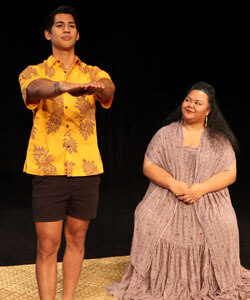
Hula and mele (song) intertwine throughout the world premiere of a hana keaka (Hawaiian theatre) at the University of Hawaiʻi at Mānoa to reveal the polarizing facets of a Hawaiian ʻohana (family) grappling with loss, identity and healing. Written and directed by UH Mānoa graduate student Joshua “Baba” Kamoaniʻala Tavares, a dual concentration acting and Hawaiian theatre and dance MFA candidate, Glitter in the Paʻakai debuts at Kennedy Theatre’s Earle Ernst Lab Theatre February 7—11.

“This story is a personal love letter towards finding healing and peace and a peek into the beautiful complexities of ʻohana,” said Tavares who is preparing to graduate this spring.
Glitter in the Paʻakai centers on the poignant return of Kaʻōnohi to his roots in Hōnaunau, Kona, as he attends his nephew’s first birthday lūʻau (Hawaiian feast). Tavares, who also hails from Hōnaunau, hopes for audiences to explore several questions while watching the production such as, “What expectations do we place on our family? What happens when they don’t meet them? How do we heal from trauma? If we lose our connection to our culture and family, what is left of our identity? What does it mean to be courageous?”
The Hawaiʻi Island native is a familiar face on Kennedy Theatre’s mainstage having starred in past productions such as award-winning comedy, Hoʻoilina, a Hawaiian hana keaka where Tavares played one of the main roles.
- Related UH News story: Comedic play to debut in Hawaiian, Pidgin and ʻōlelo māhū, March 31, 2022
“My kūpuna (elders) have guided me to this moment, truly,” as he reflects on his time in the theatre and dance MFA program at UH Mānoa. “I thought I wanted/needed to be back in New York but this program was the perfect blend of what I needed as a Kanaka Maoli (Native Hawaiian) artist.”
Ticket information
Glitter in the Paʻakai will be performed February 7–10 at 7:30 p.m. with a matinee on February 11 at 2 p.m. A free post-show chat with Tavares and the cast will follow the Friday, February 9 performance. Ticket prices range $8–$18. The play will be performed mainly in ʻōlelo Hawaiʻi (Hawaiian language) with some English and Hawaiian Creole English.
Some themes might be better suited for older aged students and up as the play explores themes of homophobia, alcoholism, strong language and domestic abuse.

